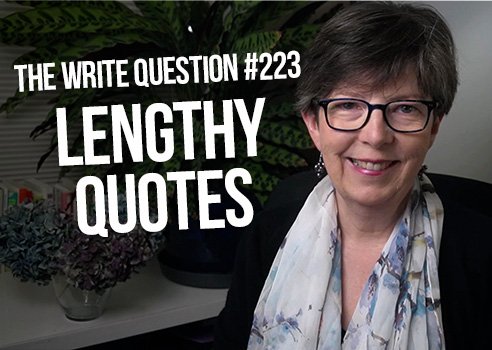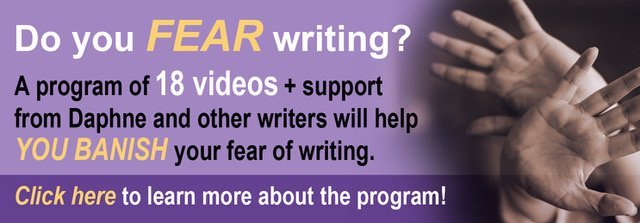Viewing time: 4 mins 39 secs
The Write Question is a weekly video podcast all about writing. Today’s question? How do you handle lengthy quotes? If you have a question you’d like me to answer you can email me, tweet me @pubcoach, or leave a message for me at the Skype account, The Write Question.
Transcript:
How do you handle lengthy quotes? That’s the topic I’m addressing today in The Write Question. I’m Daphne Gray-Grant, the Publication Coach.
I have a question from Zafarul Azam, a writer based in Rockford, Illinois. Here’s what he’s asked by email…
“I want to ask about long passages of speech. Is it okay to add paragraph breaks in lengthy passages? Or do I have to use new sets of quote marks for every new paragraph contained in the speech?”
Thanks for writing, Zafarul. This is a highly particular question and I have a specific answer for you. But first I need to make a brief digression to talk about style.
New writers often believe that there must be a right and a wrong answer to every question. But, sometimes the only reasonable answer is “it depends.”
For example, if I asked you how to spell the word colour, would you say C-O-L-O-R or C-O-L-O-U-R? Both are correct. The first is the so-called American style and the second is the so-called British one.
I use the British style because I’m Canadian and we more commonly follow British spelling. But, if I preferred, I could also adopt American spelling. Remember, both are correct. I just need to be consistent about what I choose.
These types of decisions are known as questions of style. Publishing houses, corporations and individuals get to set their own style rules. So, while I can’t spell colour K-O-L-O-R I’m free to choose between British and American spellings, as long as I’m consistent. This means I also need to adopt other British spelling rules: for example, theatre with an R-E at the end and licence with two Cs and no S.
Here’s one other point to keep in mind: you can also be very specific about how you’re going to execute the rules.
For example, I was a senior editor at a Canadian metropolitan daily newspaper back in the 1980s. In those days our rule was: use the British spelling except where the American is shorter. So, for many years, we spelled theatre with R-E at the end and colour without the U. Readers found this hugely confusing and we received a lot of letters of complaint about those missing U’s. Eventually, the paper changed the rule to specify that all words with a British spelling ending in O-U-R should be left that way, even though they were longer.
These variations can be hard for outsiders or non-professionals to notice. But it’s the kind of work that copy editors do. It’s challenging. It’s picky. And it requires great skill.
With respect to your question about lengthy quotes, Zafarul, I can tell you the style that daily newspapers use.
Newspapers have very narrow columns. Often, stories are no wider than an inch and a half. As a result, newspaper editors paragraph frequently, sometimes as often as once a sentence. They do this because paragraph breaks make the text look more appealing and not quite so intimidating.
So, yes, we would feel free to break a long quote wherever it felt appropriate. And the style was to have quote marks at the beginning of each paragraph but none at the end, until the quote was finally finished. I hope the example I’m showing on screen makes this clear.
Finally, let me wrap up with the words of American writer A.A. Milne: “A quotation is a handy thing to have about, saving one the trouble of thinking for oneself, always a laborious business.”
Zafarul, I hope you find this information helpful. Just be aware that if you’re talking about a book manuscript, the publishing house you’re approaching will have their own style for quotes. For this reason, the most important thing to remember is to be consistent.
*
If you’d like to learn more about how to make your writing a happier and more rewarding process, check out my latest book Your Happy First Draft. I don’t sell it in bookstores or via Amazon. The only place to buy it is on my website, link on the screen below and in the show notes.


